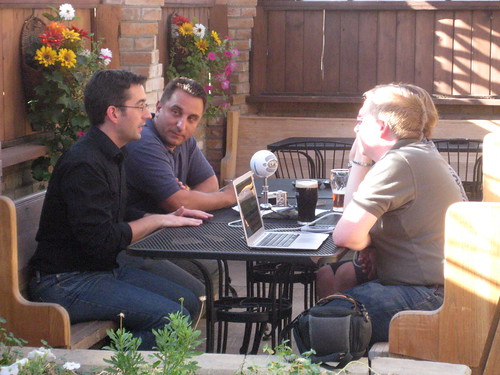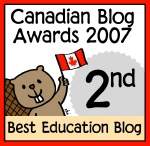I just noticed Just Tweet It – The Directory for Twitter Users.

Add your name to the directory or search for other educational (or other) Tweeters here.

I just noticed Just Tweet It – The Directory for Twitter Users.

Add your name to the directory or search for other educational (or other) Tweeters here.
If you still haven’t gotten into Twitter, but are looking for another reason to check it out, this may help. The Centre for Learning and Performance Technologies has put together a list of 100+ eLearning professionals that you may want to follow on Twitter. Disclosure: I was included on the list, so I feel a bit funny promoting it.
Twitter has been and continues to be one of the most important tools for communicating and connecting within my personal learning network. If you want to give Twitter a try, the list of people to follow would be a great place to start. From there, you may discover some of the other great people that SHOULD be on the list, those that I take value from every single day.
I ran across Yammer tonight. From the demo video found on the home page, Yammer looks much like Twitter but your potential network is defined by your organization’s domain (like Google Sites). I see later that Yammer is billed as “Twitter for Enterprise“.
So I signed up using my uregina.ca domain. Looks like I’m the first and only one there. One is a lonely number when you are dealing with social networks. :-(

I really like the concept of Yammer, and am already thinking about how I could use it as a communications tool in my next class, or actually use it with my colleagues. Wow, that could be really useful!
Check it out.
I do not know much about this free tool, but I was just notified that Edmodo has launched.
Edmodo is a private microblogging platform developed for use in the classroom by teachers and students. Edmodo provides teachers and students the ability to share notes, links, and files to foster communication inside and outside of the classroom. Teachers also have the ability to post alerts, assignments, and events to share with their students.
Edmodo looks like a very useful tool, has a clean interface (feels a bit Drupaly), and could be an excellent tool for classroom teachers looking for a private blogging option. If anyone starts using it with their students, please let me know.
From the Edtech Posse site:
Ewan McIntosh came over from Scotland to share a pint and a pretty decent conversation with us. Rob Wall, Alec Couros, Dean Shareski, Cindy Seibel and Kyle Lichtenwald sat down with Ewan at Bobby’s Tavern in Moose Jaw. A big thanks to Dean for hosting a great get together in his home city.

(Photo credit, Dean Shareski)
It was terrific to meet Ewan, and it was a great day for learning with good friends.
Jeremy Paxman, legendary BBC journalist, speaks about the changes in broadcast media as it relates to the blogosphere.
We’ve become obsessed with how the copper wire is organized and we have forgotten about the electricity.
And a very related bonus clip:
I love Jing, but:
For those that would like to use other servers, and to tweak the embed codes to fit better into your pages, check out this detailed Big IDEA post from Todd.
I have been awarded 2nd place in the educational category of the Canadian Blog Awards. I’m taking that designation with a grain of salt as there are many excellent Canadian educational blogs that weren’t even mentioned in the process. Thus, I’d like to start a list of active, longer-term, Canadian educational blogs. Here are the ones I know from memory, listed in no particular order. I will likely start a wikied list in the near future.

Mrs. Cassidy’s Classroom Blog – Kathy Cassidy
Make it Interesting – Chris Harbeck
Webbed Feat – Sylvia Currie
Clint Lalonde dot net – Clint Lalonde
samlab – Doug Symington
A Difference – Darren Kuropatwa
Half an Hour – Stephen Downes
OLDaily – Stephen Downes
Blog of Proximal Development – Konrad Glogowski
Musings – Just Learning – Sharon Peters
Ideas and Thoughts – Dean Shareski
McToonish – Heather Ross
Open Monologue – Rob Wall
Educational Discourse – Kelly Christopherson
Light in the Woods – Kyle Lichtenwald
Remote Access – Clarence Fisher
The Teaching Life – Cyril Kesten
Rick’s Café Canadien – Rick Schwier
Classroom Tech Tips – Donna Desroches
D’Arcy Norman dot net – D’Arcy Norman
Abject Learning – Brian Lamb
EdTechPost – Scott Leslie
elearnspace – George Siemens
Dave’s Educational Blog – Dave Cormier
Michael’s English Usage – Michael Lyons
Pair-a-Dimes – David Truss
Gnuosphere – Peter Rock
42/1 – Cyprien Lomas
Adventures in Instructional Support – Jim Sibley
Beyond Operant Conditioning and Bells – Stephanie Chu
Bird’s Eye View – Christopher Brooks
ehabitus – Norm Friesen
Michelle’s Online Learning Freakout Party Zone – Michelle Lamberson
Terry Anderson Blog – Terry Anderson
Free Resources for (Special) Education – Paul Hamilton
Allright. Who am I missing?
Update: I’ve created a wiki link. You’ll need to join the wikispace to add or edit the list. It would be great if we could categorize these as well.
Peter Rock has asked some fair questions about Twitter on his blog.
I already use a blog and an RSS aggregator. Is adding Twitter as a tool to post and receive information going to enhance or burden my learning experience? Is it that I need to follow only those who use Twitter effectively to enhance my learning opportunities? If so, what is “effective†twittering and how does it differ from effective blogging? Is the energy required to add Twitter to my toolbox and follow Twitterers worth the payoff? Are really good ideas and resources found often enough on Twitter that never surface in blogs?
I sent a link to his post via Twitter and asked people to respond. Within a couple of hours, he received 23 posts, many of them very insightful.
Check it out and contribute to the conversation. What are your thoughts on Twitter?
Sometimes I worry that my sharing of links in Twitter may be seen by some as spamming. After all, dropping links into Twitter does not usually answer its prime question “What are you doing?”, and to some, that may be perceived as breaking one of the Twitter commandments.
A while back, I shared the comiqs.com link. Brian Van Dyck, a middle years teacher located in Sunnydale California, thought there might be some potential for his students. I noticed these recent tweets from Brian.
@courosa the http://comiqs.com/ was a hit with 6th graders. Book reports and story boarding for narrative writing underway. Thank you! (link)
@courosa One of my students is featured on Comiqs. Working on “How To” writing. http://tinyurl.com/ynrjwd One proud teacher here. Thanks. (link)
Here is one of those featured Comiqs, “How to Catch Crayfish.”
This is a really neat piece from a very creative 6th grader, and it demonstrates the potential for a tool like this in the right hands, with the appropriate encouragement from a teacher. This is great to see, Brian. Do congratulate your students!
And, to get to a bigger point, I still think it is amazing to see such a tiny digital event can positively affect students over 2700 kilometres away. This is the type of thing that I have experienced many times, but usually on the recipient end. My students and I have benefited countless times from the Twitter network, and this reciprocity may be one of the most compelling reasons I have for my continued use of Twitter.
One of my colleagues in the Faculty of Education has partnered a group of undergraduate student teachers with Kathy Cassidy’s Grade 1 classroom in Moose Jaw, Saskatchewan. Today, I noticed a post from Mrs. Cassidy reflecting on the immediate impact of this mentor relationship on her students.
Having these “big” blogging buddies has already impacted the writing of the children. As we headed off to the computer lab the other day, instead of reminding the children about what good writers do, I asked them what kinds of things their blogging buddies would be looking for in their writing. Because I provided the U of R students with grade one end of year expectations and they have been using these to make comments on my students’ blogs (which I have been reading aloud so that all of the children benefit), the children easily told me. “A period at the end.†“Starting with a capital letter.†“Spaces between words.†“Sounding out the words.â€
The remarkable thing was that as they wrote on their blogs that day, they obviously thought about their blogging buddy audience. Not only did some of them address their writing directly to their buddy, (for example, “I like your name and i oslu like you.â€) but there were more periods, capital letters and spaces in evidence than I had ever seen in their writing before. An authentic audience is a powerful thing.
Sounds like a great experience for these students, both younger and older, and one that we all can learn from.

Cool, I made it to round 2 of the Canadian Blog Awards in the Education category.
I’m very happy to have made it through the first round, although I know MANY excellent Canadian blogs that were not nominated. Please vote for the blog you think is most worthy of this award.